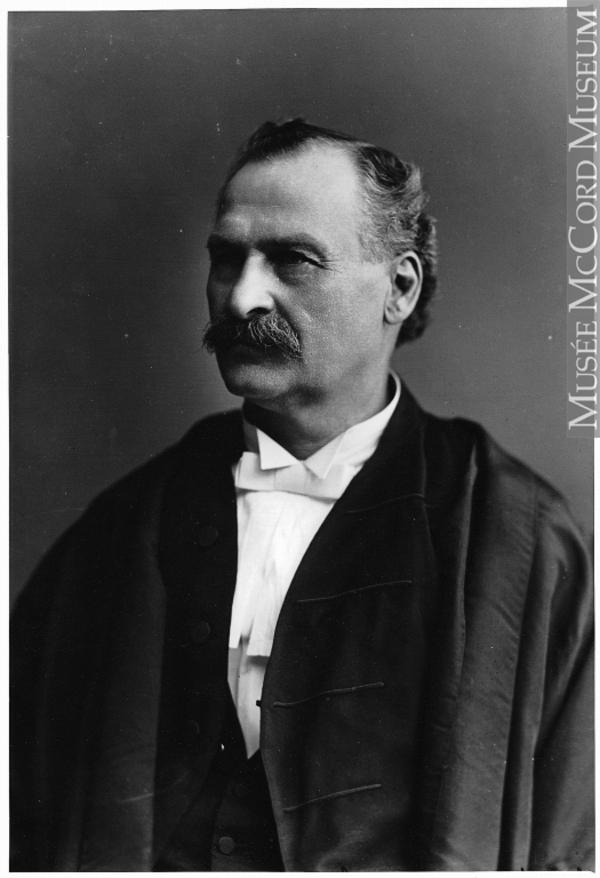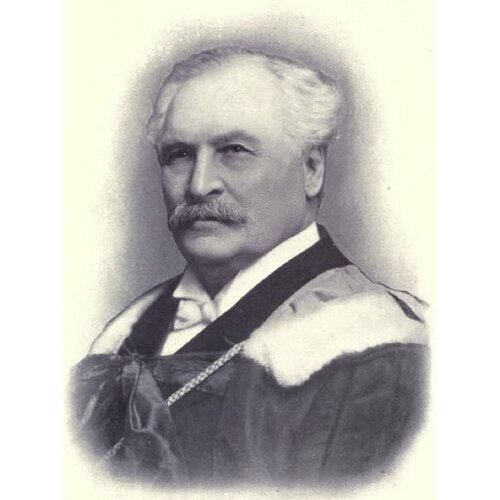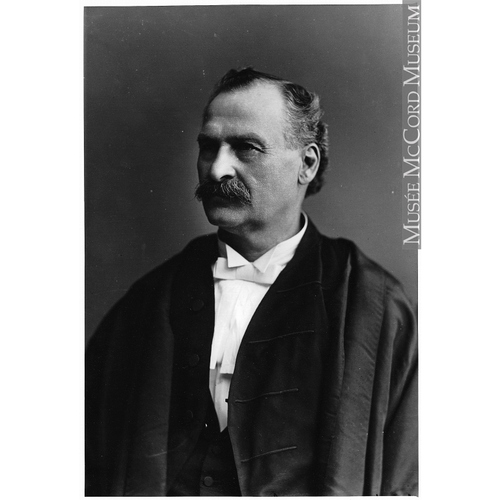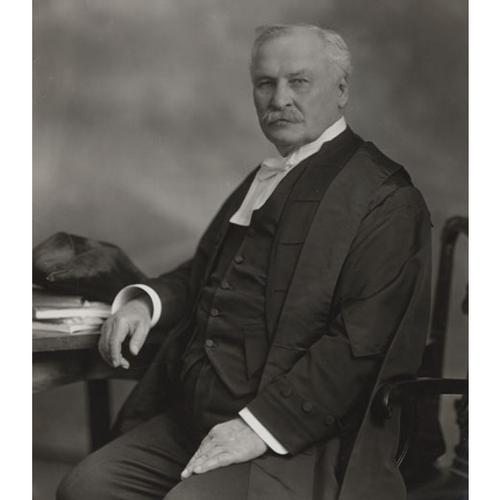
Source: Link
MATHIEU, MICHEL, notary, lawyer, politician, publisher, judge, and professor; b. 20 Dec. 1838 in Sorel, Lower Canada, son of Joseph Mathieu, a farmer, and Edwige (Hedwige) Vandal; m. there first 22 June 1863 Thirza Saint-Louis, daughter of Augustin Saint-Louis and Joséphine Desaulniers; m. there secondly 29 Oct. 1871 Amélie Armstrong, daughter of David Morrison Armstrong, a member of the Legislative Council, and Léocadie Deligny; these marriages produced four children, of whom only one survived their father; d. 30 July 1916 in Montreal and was buried 1 August in Sorel.
Michel Mathieu entered the Séminaire de Saint-Hyacinthe in 1854 and completed his classical studies in 1859. He was then articled to the Sorel notary John George Crebassa and became a member of the Richelieu Board of Notaries in 1864. Although he remained in notarial practice until 1868, he was called to the bar in 1865 and appointed sheriff of the Richelieu district in 1866.
Drawn to political life, Mathieu ran as a Conservative for Richelieu in the federal election of 1872, defeating Georges-Isidore Barthe”. Two years later he himself lost the seat. Mathieu’s political activities led him to take an interest in the press. He was the owner of the Conservative weekly Le Courrier de Richelieu, which he published in Sorel from 1872 to 1874. Soon after his defeat in the federal election, he went back into public life, being returned by acclamation in 1875 as the provincial member for Richelieu. He won a second time but resigned in 1881 to accept appointment to the judiciary. During his years in the legislature Mathieu took an active part in debates. In fact, had he not been put on the bench, he might well have had a brilliant political career. In addition to his seat in the Legislative Assembly, Mathieu held the mayoralty of Sorel from 1876 to 1882.
Named a judge of the Quebec Superior Court on 3 Oct. 1881, Mathieu was assigned to the judicial district of Joliette and then, two years later, to that of Montreal, where he sat for more than 25 years. In the course of his long experience as a judge of a court of first instance, in 1895 he presided in Beauharnois at the trial of Valentine Shortis*, who was accused of murdering two people in a factory at Salaberry-de-Valleyfield. The case involved a defendant from a wealthy Irish family and prominent lawyers, as well as many expert witnesses, and thus was widely covered in the Canadian press.
In 1886, while still carrying out his duties as a judge, Mathieu was appointed professor of civil law at the Université Laval in Montreal. When Louis-Amable Jetté became lieutenant governor in 1898, Mathieu succeeded him as dean of the faculty, a position he retained until 1915. During his many years of teaching he apparently was well liked by his students, who found his lectures interesting.
Mathieu played a key role in developing the field of legal publication in the second half of the 19th century. In 1869 at Sorel he and another lawyer, Adolphe Germain, had founded La Revue légale, a periodical devoted to legal theory and judicial decisions. In an article written for it that year, Mathieu criticized Prime Minister Sir John A. Macdonald*’s plan to set up a Canadian court with jurisdiction over the whole country [see Sir Samuel Henry Strong*]. For the sake of preserving Quebec civil law intact, he opposed the creation of such a supreme court, with a majority of judges drawn from the common law provinces, which would have the power to rule on cases within the realm of civil law. Mathieu kept overall control of the production of La Revue légale for about 12 years; it was then purchased by Amédée Périard, a Montreal bookseller and publisher specializing in law, who retained him as editor. The journal, which had soon dropped its theoretical emphasis, underwent a major transformation in 1886. Following the practice in French legal periodicals, Mathieu began to write long commentaries in copious footnotes about certain decisions, endeavouring to situate them within the body of jurisprudence. The many references to judgements and to theoretical writings gave the footnotes an erudite character. According to the lawyer Jean-Joseph Beauchamp*, the journal had by then achieved an importance never before reached by other volumes of decisions. Mathieu was also a contributor to the Lower Canada Jurist/Collection de decisions du Bas-Canada and to the Rapports Judiciaires officiels de Québec, which were published in Montreal.
Mathieu’s major editorial work is his Rapports judiciaires révisés de la province de Québec . . . , a retrospective edition of judgements rendered by the province’s courts. This vast repertory of jurisprudence was brought out in 29 volumes from 1891 to 1905 and contains decisions published before 1892 in various collections. From the mass of rulings in those collections, Mathieu weeded out the ones he considered unnecessary, and then grouped by case the decisions from both lower and higher courts. He also attempted to update old jurisprudence through annotations that pointed out connections with legislation in force at the end of the 19th century. This work of consolidation was a true achievement. It saved the practising lawyer the cost of purchasing the old compilations and also the effort of reconstructing the sequence of rulings. Mathieu presented it as a supplement to the casebooks issued by the bar from 1892. It is no coincidence that the two projects ran concomitantly. Both sought to reorganize the communication of such information so as to make the whole corpus of jurisprudence more accessible, for both past and future judgements.
In addition to these long-term works, Mathieu published several reference books. Probably the most noteworthy is his annotated edition of the Traité des substitutions fidéicommissaires . . . , by the French jurist Claude-François Thévenot d’Essaule de Savigny, published in Montreal in 1888. Substitution was a method frequently used in Quebec at that time for passing on an inheritance. Jurists in the province could not, however, rely on the French doctrine as they were then doing; the adoption of restrictive measures at the time of the French revolution and afterward effectively limited application of the method and meant that the practice no longer gave rise to detailed commentaries. Mathieu’s work was an attempt to fill this documentary void. In addition, like some of his colleagues, he prepared editions of the Civil Code (published in 1898 and 1909), the Code of Civil Procedure (1893 and 1910), and the Municipal Code (1886 and 1894). He also published a Table alphabétique des causes de la province de Québec . . . (2v., Montreal), a reference work that enables practising lawyers to find decisions quickly.
Mathieu was not able to bring all his projects to completion. An edition of François Dareau’s classic legal work on verbal abuse did not see the light of day, despite a commitment to the publisher Amédée Périard. And in 1913 he suffered an accident which prevented him from finishing a legal encyclopedia he had begun editing.
Mathieu’s accomplishments received recognition on several occasions. The provincial government appointed him to chair the royal commission set up in 1892 to examine corrupt practices of Honoré Mercier*’s government, but illness prevented him from completing the task. In 1910 he served on the commission to revise the Municipal Code. When he retired as judge of the superior court in 1909, Mathieu became a much-sought-after legal adviser. In the course of his career he received a number of distinctions. The governor general bestowed a qc on him in 1880, and in the same year that he was appointed professor of law the Université Laval gave him an honorary doctorate.
One of the outstanding jurists of his time, Michel Mathieu not only carried out important duties in the Montreal legal community as a judge and professor of law, but also played a notable role in the development of a Quebec legal literature. He founded a periodical and was the author of several volumes, but it was especially as a commentator on judicial rulings that he distinguished himself. His many works ensured that jurisprudence would be disseminated and undoubtedly helped to stabilize law in the period immediately following the codification of the civil laws in Lower Canada.
ANQ-M, CE3-1, 20 déc. 1838; CE3-7, 22 juin 1863, 29 oct. 1871; CN3–62. Arch. du Séminaire de Saint-Hyacinthe, Qué., Fichier des étudiants. Le Devoir, 31 juill., 1er août 1916. Gazette (Montreal), 31 July 1916. Montreal Daily Star, 31 July 1916. La Presse, 31 July 1916. Azarie Couillard Després, Histoire de Sorel: de ses origines à nos jours (Sorel, Qué., 1926; réimpr., 1980). I.-J. Deslauriers, Les cours de justice et la magistrature du Québec (2v., Québec, [1991–92]), 1: 267. DPQ. M. L. Friedland, The case of Valentine Shortis; a true story of crime and politics in Canada (Toronto and London, 1986). J. Hamelin et al., La presse québécoise, 2: 197. Jean Hétu, Album souvenir, 1878–1978: centenaire de la faculté de droit de l’université de Montréal (Montréal, 1978). P.-G. Roy, Les juges de la prov. de Québec.
Cite This Article
Sylvio Normand, “MATHIEU, MICHEL,” in Dictionary of Canadian Biography, vol. 14, University of Toronto/Université Laval, 2003–, accessed February 20, 2026, https://www.biographi.ca/en/bio/mathieu_michel_14E.html.
The citation above shows the format for footnotes and endnotes according to the Chicago manual of style (16th edition). Information to be used in other citation formats:
| Permalink: | https://www.biographi.ca/en/bio/mathieu_michel_14E.html |
| Author of Article: | Sylvio Normand |
| Title of Article: | MATHIEU, MICHEL |
| Publication Name: | Dictionary of Canadian Biography, vol. 14 |
| Publisher: | University of Toronto/Université Laval |
| Year of publication: | 1998 |
| Year of revision: | 1998 |
| Access Date: | February 20, 2026 |





